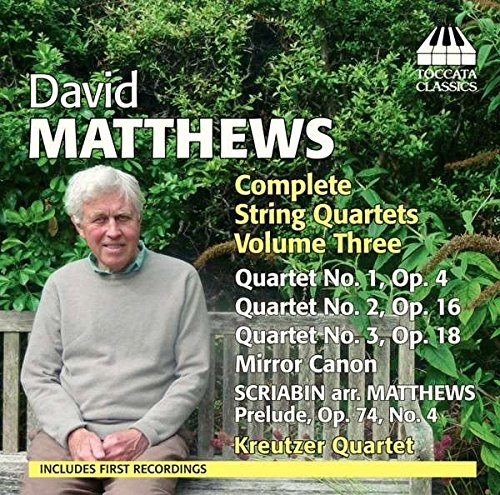MATTHEWS Complete String Quartets Vol 3
View record and artist detailsRecord and Artist Details
Composer or Director: David Matthews, Alexander Scriabin
Genre:
Chamber
Label: Toccata Classics
Magazine Review Date: 02/2015
Media Format: CD or Download
Media Runtime: 64
Mastering:
DDD
Catalogue Number: TOCC0060

Tracks:
| Composition | Artist Credit |
|---|---|
| String Quartet No 1 |
David Matthews, Composer
David Matthews, Composer Kreutzer Quartet |
| String Quartet No 2 |
David Matthews, Composer
David Matthews, Composer Kreutzer Quartet |
| String Quartet No 3 |
David Matthews, Composer
David Matthews, Composer Kreutzer Quartet |
| (5) Preludes, Movement: Lent, vague, indécis |
Alexander Scriabin, Composer
Alexander Scriabin, Composer Kreutzer Quartet |
Author: David Fanning
The influences Matthews declares in respect of his First Quartet come from Bartók, Tippett, Berg, Schoenberg and his teacher Nicholas Maw, and there is an actual quotation from Beethoven’s Piano Sonata Op 110. This last is well enough integrated that it only jumped out at me on third hearing – less owing to my inattention, I think, than to my absorption in the wealth of ideas surrounding it. Whether the piece adds up to more than the sum of its parts – and it certainly feels like it is intended to – I’m not so sure, even after four hearings. The two and a half-minute concluding Allegro feels a little lightweight to achieve that.
In addition to all the above-named affinities, Matthews could not have been assistant to Britten for four years without something of the language and craftsmanly resourcefulness rubbing off, which is entirely a positive thing. His ‘commitment to a music that is…connected to the vernacular’ is less easy to spot. He mentions that the central Scherzo of the three-movement Second Quartet is ‘influenced by The Who and The Velvet Underground’ but he might equally well have cited Tippett’s Second Symphony. Be that as it may, the movement certainly punches above its weight. I’m less sure that the longish Elegy finale is sufficiently concentrated in invention to hold the attention, for all its textural fascination (shades here of Peter Sculthorpe, another credited influence).
The Third Quartet begins with a rocket-like gesture (out of Stravinsky’s Symphony in Three Movements?). Thereafter Matthews risks a calculated process of ‘gradual slowing-down and loss of momentum’, and again I’m not sure he quite brings it off. By this stage I could not ward off a certain frustration at the music’s not staying longer with an idea in order to get the maximum juice out of it; and while its magpie quality may be engaging, it can also be a little irritating. An attractive, antique-sounding Mirror Canon and an arrangement of one of Scriabin’s late piano preludes round off the disc.
Lithe, agile performances from the Kreutzer Quartet, cleanly recorded, give a strong sense of Matthews’s musical profile and bode well for the (presumably two) remaining volumes.
Discover the world's largest classical music catalogue with Presto Music.

Gramophone Digital Club
- Digital Edition
- Digital Archive
- Reviews Database
- Full website access
From £8.75 / month
Subscribe
Gramophone Full Club
- Print Edition
- Digital Edition
- Digital Archive
- Reviews Database
- Full website access
From £11.00 / month
Subscribe
If you are a library, university or other organisation that would be interested in an institutional subscription to Gramophone please click here for further information.




